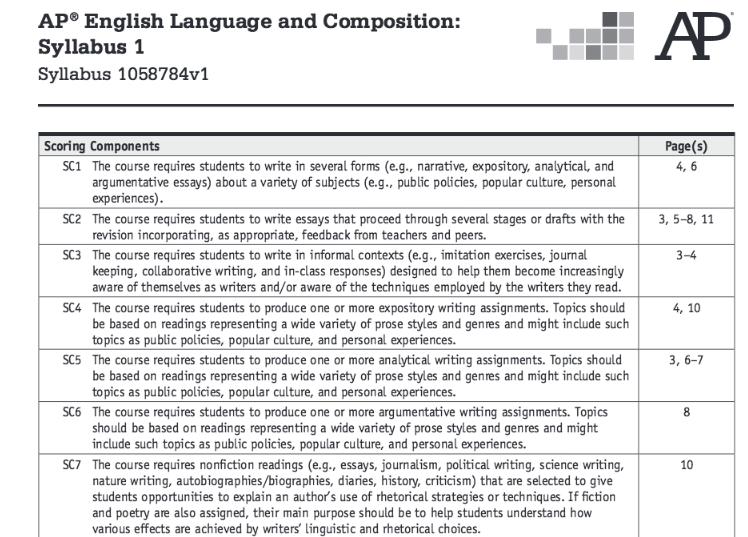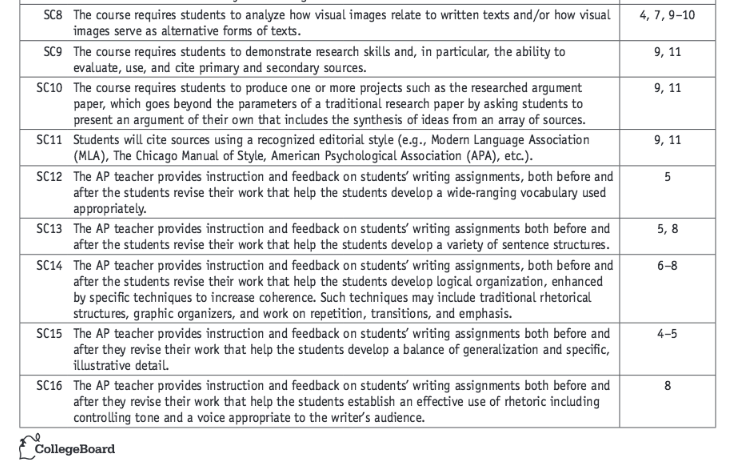
Need to learn the ins and outs of the AP auditing process? You're in luck. Whether you’re a new teacher or just new to AP, check out this guide to make sure your course is approved! We will explain the auditing process in detail, including how AP courses are reviewed, how to submit your audit, and how to write an appropriate syllabus.
What Is Course Auditing? Why Do You Need It?
AP Course auditing is what allows a school to officially give a course the “AP” label. Having classes with the official AP label is important for your students' transcripts, especially if they are applying to prestigious schools and scholarships. The AP label shows colleges and scholarship committees that your school’s courses have a high level of rigor.
That said, a course does not have to carry the official “AP” label for your school to order the corresponding AP exams. For example, you could teach a course titled just “United States History” and still order the AP United States Exam for your class at the end of the year. But generally, if you’re teaching a course with the goal of your students taking the AP exam, it’s worth it to go through the audit to get the “AP” label to improve your students’ transcripts.
AP course are audited once every year, but it’s the most onerous the first time your course is approved. Each year after your first audit you just go through a quick renewal process.
During that first audit, you’ll submit a detailed syllabus of your AP course as well as an AP Course Audit form for review. For the rest of this guide, we will go over that first auditing process, explain re-auditing, and finally give some tips for writing your syllabus for the first audit.
What Happens During My First Audit?
For your first audit, you'll create an online account with the College Board and submit the AP Course Audit form and a copy of your syllabus (more on that process below). Once your form is approved by a Course Audit administrator, your syllabus will be forwarded to an external college faculty reviewer who will approve it. You’ll learn if your course was approved by the College Board within 60 days of submitting your forms. For a course to be authorized, the syllabus has to clearly show that each of the AP course's curricular requirements is included in your class.
There are two possible outcomes of the first review:
1. Good news: Your reviewer finds that your syllabus meets all requirements, and your class is approved. You'll be notified via email, and then you'll be all done with the auditing process!

Good news!
2. Bad news: The reviewer does not think your syllabus meets or exceeds the requirements, and your syllabus is passed on to a senior reviewer. If the senior reviewer agrees, the senior reviewer will send you an email with a rationale as to why your syllabus wasn't approved. You can then revise and resubmit your syllabus based on that feedback. If, after submitting a revised syllabus, the reviewers still don't think your syllabus meets the requirements, the College Board will provide a curriculum adviser to provide additional suggestions for how your syllabus should be revised.
You will then have a third and final chance to revise and submit the syllabus. If your course isn’t approved on your third try, it won’t be authorized for that year. (Again, your school can still order and administer AP Exams for that subject regardless of the audit outcome.) You can re-submit materials for authorization starting next year.
How to Start Your First Audit
To start, you'll need to create an online AP Course Audit account with College Board. Through this account, you can submit the Course Audit form and your syllabus.
The AP Course Audit form is where you list information about the class, your school, your district, and your students. It’s fairly straightforward and shouldn't take more than a few minutes.
The syllabus is where you describe your course in detail and explain how it meets AP guidelines. Writing an appropriate syllabus is the most important and time-consuming piece of the auditing process.
During the audit, the College Board isn’t looking at your background or credentials as a teacher, and it doesn’t require any specific professional development for you to get your course certified — they’re just checking to see if your course aligns with the AP class’s goals.
And in case you're worried, the College Board isn’t going to randomly drop in during the year and monitor your actual class — you just need to get the syllabus right! We'll break down how to write an appropriate syllabus below.
Re-Auditing
Technically, even after your course is approved, you still have to re-audit every year if you want your class to keep the “AP” title. Fortunately, you don’t have to do much work for re-authorization.
After you get your initial approval, you don’t need to resubmit the Course Audit form or a syllabus unless your course changes significantly, the AP course itself changes, or a new teacher is given the class.
Beginning every August, Course Audit administrators can renew AP classes for the following year through their online AP Course Audit accounts. If you’re not sure who your school’s Course Audit administrator is, ask the head of your department or someone in your school’s administration.

The Course Audit administrator is probably someone who doesn't mind lots of paperwork.
In short, your course should be re-approved without you having to do anything unless you make major changes or switch courses at your school.
If a new teacher is assigned to an existing AP class, he or she must resubmit the Course Audit form and syllabus. However, they can use the old teacher’s syllabus, so the approval process should be pretty quick.
Writing Your Syllabus
Like we mentioned above, the AP Course Audit is just the submission of a form and your syllabus, so the syllabus is the main piece of work you have to complete.
On this page, you can find detailed info about each AP class, including a checklist for the syllabus and example syllabi. Definitely make use of this page as you write your syllabus!
This guide will focus on AP English Language, the most popular AP class, but we will go through the general syllabus-writing process that you can use for any AP class.
First, take a look at the example syllabi College Board has posted for your class. This will give you a sense of what College Board is looking for in your syllabus. As a guide, College Board has posted four example syllabi for AP English Language:
The first thing you'll probably notice in these syllabi is the cover page, which lists all the scoring components for the syllabus and where they are addressed:


Source: The College Board
A cover page is not required for submitting your syllabus, but using one can help you keep track of the various requirements you need to meet for your syllabus. If you're overwhelmed by the requirements for your class, using an organizer like this cover page could be incredibly helpful. You can get a sample cover page for every AP class by going to the webpage for each class, linked above.
You will need to write a syllabus that explains your class’s assignments, structure, and reading list so that it fits into the AP guidelines. It’s going to be pretty long — at least 10 pages — so make sure you set aside some quality time to write it.
In addition to using the example syllabi on College Board’s website as a guide, you can also reach out to another AP teacher at your school to learn how they approached their syllabus. They might have some tips for writing a College Board-approved syllabus or have more inside information on the auditing process.
If you're worried that you may have a hard time sticking to this incredibly detailed syllabus, don't stress. You’re never held accountable by College Board for sticking to this syllabus, so you don’t have to follow it to the letter. Finally, remember you’re given two additional chances to revise your syllabus if it doesn’t pass the audit the first time.
Using the College Board's Self-Evaluation Checklist
After you’ve written your syllabus, go through the self-evaluation checklist that the College Board has made for your class. (You can find all AP course checklists at the link above.) Read through the items on the list and make sure your syllabus addresses each one. In addition to the cover page, reviewing the checklist should ensure that your syllabus meets all the College Board's guidelines and will be approved.
As an example, this is the list for AP English Language and Composition:
- Have you read through the most recent AP English course description?
- Do you require students to write in several forms during the year (narrative, expository, analytical, and argumentative essays) as well as write about a variety of subjects (public policies, pop culture, personal experiences)?
- Do you have essays that go through several stages or drafts, with revision by you or other students?
- Do you also have students write in informal contexts (imitation exercises, journal keeping, collaborative writing, and in-class responses)?
- Do you assign nonfiction readings (e.g., essays, journalism, political writing, science writing, nature writing, autobiographies/biographies, diaries, history, criticism) to give students opportunities to identify and explain an author's use of rhetorical strategies and techniques? (If you use fiction and poetry, it should be to help students understand how various effects are achieved by writers' linguistic and rhetorical choices.) [Note: you can see a list of possible authors and works in the AP English Language course description.]
- Do you teach students to analyze how graphics and images both relate to written text and serve as texts themselves?
- Do you teach research skills, specifically the ability to evaluate, use, and cite sources?
- Do you assign a researched argument paper, which has students both cite and synthesize various sources to come up with their own argument?
- Do you have students cite sources using a standard style (like Modern Language Association or Chicago Manual of Style)?
- Do you give instruction and feedback on student writing focused on these skills: wide and effective vocabulary, variety of sentence structures, logical organization, balance of generalization and specific detail, effective use or rhetoric?
The College Board's auditors will be using that same checklist to evaluate your syllabus. If your syllabus falls short on any of these questions, make sure to edit it before you submit it for review! It may also be helpful to have another teacher read through your syllabus and confirm that it clearly meets the checklist guidelines.
Other Syllabus Tips
The deadline for your first submission to authorize a course taught in 2016-17 is January 31, 2017. Make sure to start working on your syllabus well before that deadline!
If your school has a multi-year course sequence leading to an AP class (for example, an honors biology class that feeds into AP Biology), only the course taken in the year that ends in the actual AP exam can carry the "AP" label. However, ;you should still submit syllabi from both courses if the first year includes some AP class material.
If your school has an interdisciplinary class, e.g. “American Studies,” that encompasses both history and literature, you can apply separately for AP the English Literature label and AP United States History label. Your final class might be called American Studies (AP English Lit/AP United States History). Just make sure you don't try to rename your final class something like "AP American Studies."
Many AP science courses require a hands-on lab where “students manipulate, observe, explore, and think about science using concrete materials.” If you want examples of hands-on labs for the various science classes, check out the course’s page at the AP Course Audit website.
Finally, if you want to read a first-person account from a teacher going through the audit process, including how a syllabus evolves to meet College Board standards, check out this blog post by Adrian Dingle. He writes in detail about how he had to edit his AP chemistry syllabus to get it approved, even when the College Board's requirements didn't seem to make a lot of sense.
For example, he says while trying to meet a requirement about connecting chemistry to the real world: “It seems as though they want me to describe an assignment with a specific topic for connecting chemistry to the real world. I’m just not prepared to do that at this stage — who KNOWS what current event might come up during the course that I think will make for a great opportunity to fulfill this criteria?”
The main takeaway from his post is that even after extensive and sometimes annoying edits, he was still able to get his course approved by the College Board. Even though going through your first AP audit can be a bit nerve-wracking and time-consuming, remember that you have several chances to revise your syllabus. Don’t feel pressured to get it perfect the first time! As long as you give it enough time and work to follow College Board's requirements, your syllabus should be approved.
What’s Next?
The audit process is fairly strict and not always a favorite among teachers. What are some other problems with the College Board’s AP program? Read in-depth about some of the AP program's problems.
Are any of your students studying for the ACT or SAT? Does your school have an SAT/ACT class or tutoring program? If not, learn about the best way to teach the ACT / SAT to give your students the support they need.
Teaching AP US History? We have a list of the best textbooks on the market.











